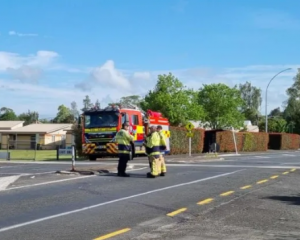One man killed 65 cats, landing him a $500 prize.
Cat hunters in North Canterbury also clashed with animal rights protesters - who claim they were forced to flee when children threw rocks at them after they took custody of a baby possum.
Children under 14 were not able to compete in the competition, but a video provided by the Animal Save Movement protesters shows a small child dragging a dead cat through an obstacle course.
Event organiser Matt Bailey told Checkpoint the group was a fundraising committee of farmers and their partners, who donated to their local school and donated to those in need.
He said the competition started as a local pig-hunting competition then became a cat-hunting competition, as they noticed a growing number of feral cats.
"The cat side of it started as a meeting in a woolshed, we'd had a few beers and someone said, oh, there's a few more cats than the previous year and we didn't have a category for them, let's put them in," he said.
Bailey said on his farm he kills at least 40 cats a year due to the risk of the cats bringing diseases onto his farm.
"It's nothing new to us, but unfortunately New Zealand is a cat-loving country so we've had controversy from different groups," he said.
"They're quite stealthy animals that you don't see often, but they are there. My mate Jimmy Maxwell got 65 on his property down there at the Hurunui river. He's a passionate conservationist.
"He's doing a good job and it just goes to show that when you start trapping them there's a lot there."
Are household cats caught up in the competition?
Bailey told Checkpoint the cats were caught in box traps, which must be placed 10 kilometres from any residential areas, and the traps were checked every day.
He said a minimum of a .22 rifle was also used to kill them.
"If something happens to have a collar, which I doubt it would, you know they can take the means to get it back to whoever," he said.
Bailey said there were rules to ensure they were not trapping household cats.
"If a cat gets that far out, I think the questions gotta go back to the owner, why's your cat 10 kilometres away from home?"
He could tell a feral cat when it was caged, he said.
"These are possessed by the devil or like the devil on methamphetamine. These are feral wild beasts. They will try and attack you, if you got your hand near the cage, they will try to and have you, you can see the evil in their eyes," he said.
"We used to have a family cat and when you put it in a cage they get a wee bit upset, but they're nothing compared to these things. They're different class completely."
The dead cats were dumped in an offal hole, he said, where other dead farm animals were disposed of and some of the cats will get their skins tanned to be sold at A&P shows.
Legislation needed, event organiser says
Bailey said legislation must be introduced to stop people dumping cats in the countryside.
"We need some legislation in place. We need desexing and microchipping and registering like your dogs. These cats have free rein and they can do what they want and we need to stop people breeding these animals and dumping them out here in the countryside."
Jimmy Maxwell caught a lot of cats that had been dumped by the Hurunui River, some which were kittens, he said.
"They just turn up on the side of the road, so people coming out of Christchurch are just discarding these animals, thinking they're doing the right thing because they don't have the money to put them down," he said.
"We need the government to put some legislation in place, really cause it's just a shame that all these birds and lizards are dying and nothing's been done about it."
In response to videos of children at the last competition wearing animal costumes with the words 'Animal Slay Movement' printed on them, that was "just a bit of a laugh", he said.
"We're just letting the kids do what they wanna do. Protesters can turn up and think they can say what they want to say.
"We're not too worried about their feelings. It's a bit of a spoof back at them because they turn up with Animal Save Movement," he said.
"Out here in the country, we do things a bit differently."
Bailey said the publicity and protesters have "been the best thing that has happened to the competition".
"The protesters will do anything for a bit of attention, but I've always welcomed them.
"It's good. It brings publicity. We've raised this whole issue to the surface throughout the country."















